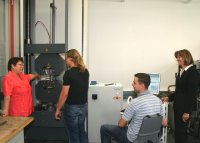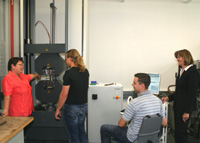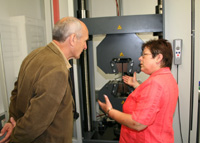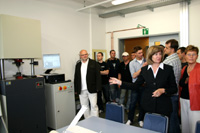15th May 2009 saw the commissioning of high-efficiency, state-of-the-art testing technology in the Materials Testing Laboratory of the Faculty of Computer Sciences, Electrical Technology and Mechanical Engineering at the Lausitz University of Applied Sciences in Senftenberg, Germany. The machines involved were the new Zwick Z 600 E materials testing machine and the Zwick HFP 5100 Vibrophore, which has just received a software upgrade.
The commissioning of these machines took place in the context of a symposium chaired by Dr. Eva Hille, with a welcoming address by Professor Günter H. Schulz, President of Lausitz University, in the Konrad-Zuse Media Centre. Installation of the new Z600 E materials testing machine was made possible by financial support from the German Research Foundation (DFG) and the state of Brandenburg, The total investment amounted to €177,000, of which 50 percent was borne by the DFG and 50 percent by the state of Brandenburg.
"A day which brings a significant improvement to the university's infrastructure is a good day for the President," stated Professor Schultz, before going on to express his appreciation for the provision of funds. He then discussed the implementation of the Bologna Process at the university, highlighting the opportunity for good-quality, application-oriented training available to students through access to the modern equipment in the EN 9001:2000-certified Materials Testing and Metallography Laboratory.
Professor Hille thanked the university management and boards for supporting the application for the necessary funds. She also thanked her staff and the laboratory workshop for help in installing the 600 kN (60-tonne) capacity materials testing machine, weighing almost five tonnes and supplied by the Zwick Roell Group. In addition to providing practical training for students, particularly those from Industrial Engineering and Management, Mechanical Engineering and Chemical Engineering courses, these machines are used for research and enable a wide range of services to be provided for industry.
Presentations were given by Walter Stolz and Petra Krummel of the Zwick Roell Group. Topics discussed in both theory and practice included the company's 150-year history, the wide range of applications for its products and in particular the large capacity machines now installed at the university. During subsequent demonstrations in the Materials Testing and Metallography Laboratory, participants were able to experience this technology in use.
The Z600 E materials testing machine and the HFP 5100 Vibrophore conform to the specialist areas defined by the university for Research and Development and are allocated primarily to Product Development and Production Technology in the Faculty of Computer Sciences, Electrical Engineering and Mechanical Engineering. Here they cater for the requirements of Brandenburg industry, particularly in the automotive, metal (production, metalworking and machining) and mechatronics sectors. Clients and/or partners are small or medium-sized undertakings and institutes from the region.
In conjunction with experimental investigations into materials, machine elements, components and assemblies it is now possible to gain insights into specific and general correlations of mechanical, dynamic and thermal loading in the context of determining, testing and checking material characteristics. The Z600 and the Vibrophore will allow expansion and modernization of the teaching and innovation capabilities of the Department of Materials Science at the University of Lausitz, enabling a link to be made between practical training and science.
The development, testing and optimization of components subject to high dynamic loadings in the automotive industry and engine and machinery manufacture is a practical reality.
The industry's market conditions, together with the need to protect health and life and avoid heavy material losses call for tougher assurances on product quality and operational safety and reliability. The aim is to collaborate with regional businesses and make available to the automotive industry reliable, fatigue-resistant components suitable for the applications such as engines and energy-conversion machinery.

The President of the University of Lausitz, Professor Günter H. Schulz (2/L) and Professor Eva Hille (L) thanking the specialist speakers, Petra Krummel and Walter Stolz.

Professor Eva Hille (R) and her Teaching and Research colleague, Heidrun Lehnig (L), with students at the new Z600 E materials testing machine.

The Chancellor of the University of Lausitz, Volker Schiffer, learns about the new testing technology

Prof. Dr. Eva Hille explains the operating principle of the HFP 5100 Vibrophore.
All illustrations courtesy of Witzmann/Hochschule Lausitz